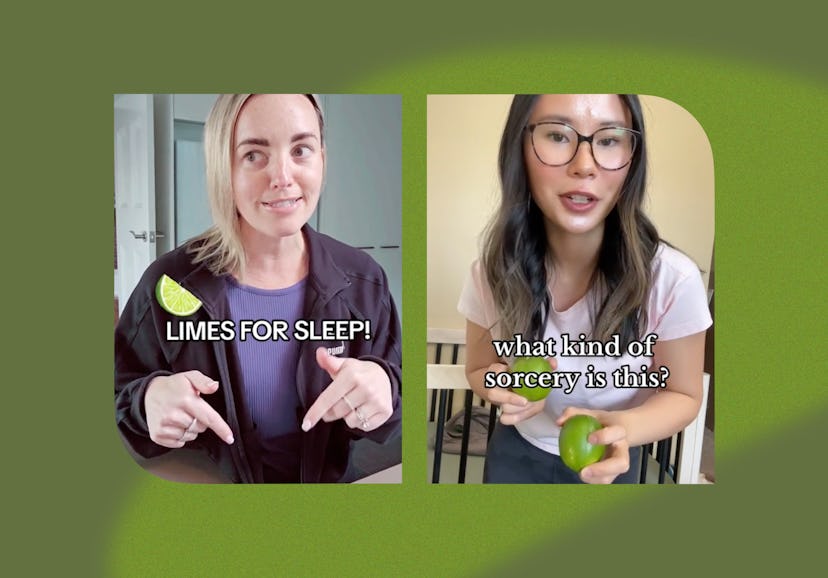You know you’re desperate for sleep when you’re willing to do something truly out there, like putting a bowl of limes next to your bed. According to TikTok’s viral lime sleep hack, this is a sneaky way to get babies to slumber through the night — and it seems to work for adults, too.
The idea was originally posted by creator Jessica Lynne, aka @jessicalynnemediumship, on March 5. Since then, the topic has gained nearly 20 million views as people slice up citrus hoping it’ll help them snooze. When I first saw this hack I assumed it had something to do with the scent of the limes, sort of like aromatherapy, but according to Lynne, the benefits are a little more spiritual.
In a follow-up video posted May 6, Lynne explained why the lime sleep hack works. “The reason why it works is because limes help to remove negative, fear-based energies [or] anything that doesn’t resonate with you, and it helps to remove bad spirits and entities from your room,” she says in her video.
For young kids, Lynne says limes help get rid of the feeling that there’s a ghost in their closet or a monster under the bed, but for adults it gets rid of everyday bad vibes — like the kind that might keep you up at night. With the scaries at bay, you’re free to snooze.
Do Limes Really Help You Sleep?
People seemed to be obsessed with the notion that a good night’s sleep could be a lime away. In Lynne’s comment section, one person wrote, “I NEED to try this for myself!!!” but others were a little more skeptical.
Another comment read, “Tried it and it legit does nothing. I’m convinced nothing will [help me sleep] at this point.” Another joked that adding gin and tonic to the limes might help them sleep even better, while someone else pointed out that it’s most likely the limonene, or the citrusy aroma, that does the trick.
In a 2022 study, citrus fragrance was associated with mood-enhancing properties, and some reports confirmed the connection between exposure to certain odors and good sleep. This is especially true if you start to associate the scent of limes with bedtime. If you smell limes every night by your pillow, it could eventually trigger you to feel sleepy.
That said, it does make you wonder if there’s something more to this hack, especially as you keep scrolling and see even more positive reviews. Creator @gabilemoine tried it and said, “OK, can someone tell me what kind of sorcery this is?” after noticing an improvement in her family’s sleep.
To find out more, I reached out to Julia Forbes, a certified sleep science coach at Sleep Advisor, who confirmed the fresh aroma might be doing the trick. “Citrus scents may reduce stress and anxiety, potentially making it easier to sleep,” she tells Bustle. She also points to the placebo effect.
If you aren’t quite ready to believe that limes absorb negative energy and entities, then it might be enough to say the act of placing them near your bed — and hoping that they’ll help you sleep — is what makes them work.
“Exploring different sleep hacks can also be fun,” Forbes adds. “Sleep experiences can vary widely, so an unconventional method like placing limes next to your bed might be effective for some but not others. If traditional sleep aids haven't worked for you and you're curious about a popular sleep hack, it might be worth a try.”
How To Try The Lime Sleep Hack
To try this hack, all you have to do is cut a lime in half and put the two halves in a dish with the juicy side facing up. Place the bowl next to your bed, climb in, get comfy, and let yourself believe you’re about to snooze through the night. Lynne recommends changing out the limes once a week, so they always stay fresh. If nothing else, it’ll be nice to have a fresh, tropical scent wafting your way while you rest, and that might be exactly what you need to sleep.
Studies referenced:
Sabiniewicz, A. (2022). Effects of odors on sleep quality in 139 healthy participants. Sci Rep. 2022 Oct 13;12(1):17165. doi: 10.1038/s41598-022-21371-5.
Source:
Julia Forbes, certified sleep science coach at Sleep Advisor
